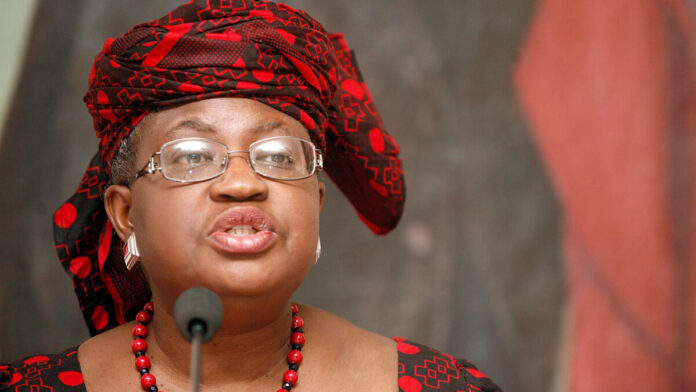Ngozi Okonjo-Iweala holds many firsts. She’s the first woman and the first African to serve as Director-General of the World Trade Organization (WTO).
She was the first female Finance Minister (2003-2006 & 2011-2015) and Foreign Affairs Minister (2006) in Nigeria. Would she, one day, be the first female president of the country?
That won’t happen in the next four years, though, as her name is not on the 2023 presidential election ballot.
But this economist, global finance virtuoso, and international development expert with over three decades of experience working in Europe, Asia, Latin America, Africa, and North America, is the most qualified person for the job. Well, ceteris paribus!
We bring you Ngozi Okonjo-Iweala’s biography.
Ngozi Okonjo-Iweala: Birth
Ngozi Okonjo-Iweala was born on June 13, 1954 in Ogwashi-Ukwu, Delta state, 32.5km from Asaba, the state capital. Her siblings are Njide, Ifechukwude, and Onyema.
Her father, Chukwuka Okonjo, was the Obi of the Obahai royal house. He died in September 2019 at 91. Her mother, Kamene Okonjo, is still alive and kicking. She’s a professor of sociology.
Ngozi Okonjo-Iweala spent most part of her childhood days in her hometown with her grandmother. Her parents were studying in Germany. They returned to Nigeria before the outset of the Civil War. The family had a firsthand experience of the most trying period in the country’s history as they were caught in the war.
Her willpower and survival instincts may have been built up during the three years of the war. Or how else would someone between 13 and 15 have had the nerve to save one of her younger ones from the jaws of death, disregarding what might have gone wrong?
She carried her malaria-stricken sister on a 10km road walk, piggyback to and from a clinic. Their mother couldn’t be of any help, as she was bedridden. Their father was many kilometers away as he was engaged in the war as a soldier. He was a brigadier of the Biafran army.
- Bola Tinubu Biography: Net Worth, Political Career, Controversies, and More
- Dino Melaye Biography: Net worth, Private Jet, and Scandals
- Olusegun Obasanjo Biography: Military/Political Career, Net worth, Polygamy
Ngozi Okonjo-Iweala: Education
She went to Queen’s School in Enugu for her primary school education. For her secondary school, she attended St Anne’s School and International School, both in Ibadan, Oyo state. In 1973, she left for the United States of America to further her education.
In 1976, she graduated in Economics from Harvard University. She earned a Ph.D. in Regional Economics and Development from the Massachusetts Institute of Technology five years later.
Her thesis was on credit policy, rural financial markets, and Nigeria’s agricultural development. She got an international fellowship from the American Association of University Women (AAUW), which supported her doctoral studies.
Ngozi Okonjo-Iweala has received honorary degrees from 15 universities worldwide, including Yale University, the University of Pennsylvania, Northern Caribbean University, Jamaica, Brown University, University of Dublin’s Trinity College, Tel Aviv University, and Amherst College, Colby College.
She also has honorary doctorate degrees from the University of Amsterdam, the Netherlands, and a host of universities in Nigeria, including Abia State University, Delta State University, Oduduwa University, Babcock University, Obafemi Awolowo University, and the Universities of Port Harcourt and Calabar.
READ: Alexx Ekubo Biography: Controversies, Net worth, Fashionista, and More
Ngozi Okonjo-Iweala’s Career
Ngozi Okonjo-Iweala had two stints as Nigeria’s Minister of Finance. She implemented a comprehensive home-grown economic reform programme that stabilized the country’s economy. This initiative also tripled the growth rate to an average of six percent per annum over three years.
In 2003, Ngozi Okonjo-Iweala spearheaded efforts to improve Nigeria’s macroeconomic management by implementing an oil-price-based fiscal rule as the pivot. Proceeds above a reference benchmark oil price were saved in a unique account, the “Excess Crude Account”. This helped to reduce macroeconomic volatility.
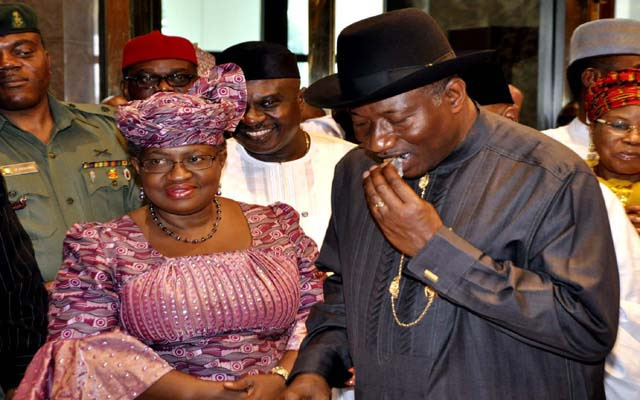
In October 2005, she led the Nigerian delegation that negotiated the cancellation of 60 percent of the country’s external debt with the Paris Club which stood at $18 billion. An innovative buy-back mechanism that wiped out Nigeria’s debt to her creditors and reduced the country’s entire external debts from $35 billion to $5 billion.
She oversaw the country’s first Sovereign credit rating of BB—from Fitch and Standard and Poor’s. The rating grouped Nigeria with countries like Vietnam, the Philippines, and Venezuela that have emerging markets.
Being a firm believer in the power of trade to lift developing countries, she was involved in trade negotiations with neighbouring West African countries. This led to the overhauling of Nigeria’s trade policy, enabling the country to enhance its competitiveness.
In her second spell in the same position, she led reform that enhanced the transparency of government accounts and strengthened institutions against corruption.
This includes the implementation of the Government Integrated Financial Management System (GIFMS), the Treasury Single Accounts (TDSA), and the Integrated Personnel and Payroll Management System (IPPMS) [a forerunner to the implemented version, Integrated Payroll and Personnel Information System (IPPIS)].
A few years after it was implemented, the IPPIS platform eliminated 62,893 ghost workers from the system. It saved the government about $1.25 billion.
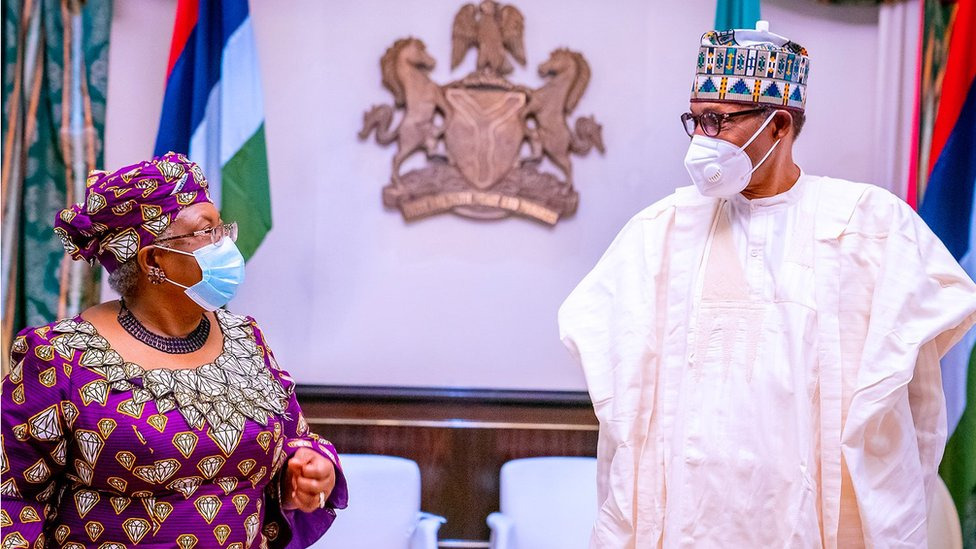
In 2013, she helped strengthen the housing sector with the establishment of the Nigerian Mortgage Refinance Corporation (NMRC). Under her watch, the National Bureau of Statistics carried out a re-basing exercise of the Gross Domestic Product (GDP), the first in 24 years.
This led the country to emerge as the largest economy in Africa ahead of South Africa.
She also empowered women and youth with a gender-responsive budgeting system – the Growing Girls and Women in Nigeria Programme (GWIN), and the celebrated Youth Enterprise with Innovation Programme (YouWIN). It supported entrepreneurs and created a lot of jobs.
Her efforts to sanitize the economy didn’t augur well with some people in the corridors of power and beyond. Her labour and trouble earned her the nickname “Okonjo-Wahala”. Some didn’t stop at name-calling as she received death threats. She also endured the harrowing experience of the kidnapping of her mother.
“My mother being kidnapped for five days was one of the worst periods of my life and it was a very tough period,” she said.
Despite the ugly episodes, she insisted that “the privilege of serving my country as finance minister for several years, to being able to work on some reforms is one of the best things I have ever done”.
At the World Bank, Ngozi Okonjo-Iweala had a 25-year career as a development economist and rose to become the Managing Director for Operations between 2007 and 2011. She had oversight responsibility for the body’s $81 billion operational portfolio in Africa, South Asia, Europe, and Central Asia.
Ngozi Okonjo-Iweala spearheaded many of the institution’s projects to assist countries with low income during the food and financial crises in 2008-2009. She chaired the replenishment of over $40 billion for the institution’s grant and soft credit arm, the International Development Association (IDA).
Ngozi Okonjo-Iweala is a member or chair of various boards and advisory groups including the World Resources Institute, ONE Campaign, the Clinton Global Initiative, the Nelson Mandela Institution, Friends of the Global Fund Africa, and the African Institute of Science and Technology and the Center for Global Development (CGD).
Her other career highlights are:
2003-2006 and 2011-2015 – a member of the International Monetary and Finance Committee of the IMF
2006-2009 – served on the Commission on Growth and Development led by Nobel Prize winner Professor Michael Spence
2012-2013 – a member of the United Nations Secretary-General’s High-Level Panel on the Post-2015 Development Agenda
2012 – was a candidate for President of the World Bank. She ran against Jose Ocampo and Jim Yong Kim. If she won, Ngozi Okonjo-Iweala would have become the body’s first female president
2015-2016 – a member of the International Commission on Financing Global Education Opportunity
January 2016 – became the chair-elect of the Board of Gavi
2019 – has been a member of UNESCO’s International Commission on the Futures of Education
2019 – has been serving on the High-Level Council on Leadership & Management for Development of the Aspen Management Partnership for Health
2020 – appointed by the International Monetary Fund’s Managing Director Kristalina Georgieva to an external advisory group to provide input on policy challenges
2020 – appointed by the AU as a special envoy to solicit to help the continent deal with the economic impact of the COVID-19 pandemic
2021 – appointed as co-chair on financing the global commons for pandemic preparedness and response
July 2021 – joined the Multilateral Leaders Task Force on COVID-19 Vaccines, Therapeutics, and Diagnostics for Developing Countries, co-chaired by Tedros Adhanom and David Malpass
January 2022 – joined The Group of thirty (G30), an independent body of distinguished policymakers from around the world
SEE: Peter Obi Networth and Biography (Everything You Should Know)
Ngozi Okonjo-Iweala: WTO

On February 15th, 2021, Ngozi Okonjo-Iweala became the seventh Director-General of the World Trade Organization (WTO). She assumed office on March 1st, 2021 and her term of office will expire on August 31st, 2025.
Established in 1994, but based on a set of rules written about 50 years before, the WTO is the only global body that deals with the rules of trade between nations. Its primary purpose is to open trade for the benefit of all.
The WTO agreements are negotiated and signed by a sizeable number of the world’s trading nations and ratified in their parliaments. The goal of the organization is to help producers of goods and services, exporters, and importers conduct their business.
RELATED TOPICS:
- Bola Tinubu Biography: Net Worth, Political Career, Controversies, and More
- Obi Cubana’s Biography: Companies, Net Worth, Controversies, and More
Ngozi Okonjo-Iweala’s Salary
The annual salary of the DG of WTO is US$183 158 before staff assessment. This resulted in a changed net salary of US$105 042 (dependency rate) or US$93 322 (single rate).
Ngozi Okonjo-Iweala’s Awards and Recognitions
She has been listed in the Top 100 Most Powerful Women in the World by Forbes in 2022, 2014, 2013, 2012, and 2011. Here are some of her other achievements and recognitions.
2004 – TIME’s European Heroes Award
2004 – Finance Minister of the Year, Africa Investor Magazine
2005 – Finance Minister of the Year for Africa and the Middle East, Emerging Markets Magazine
2005 – Global Finance Minister of the Year, Euromoney
2005 – Finance Minister of the Year for Africa and the Middle East, The Banker
2010 – Bishop John T. Walker Distinguished Humanitarian Service Award
2010 – Global Leadership Award, Columbia University School of International and Public Affairs
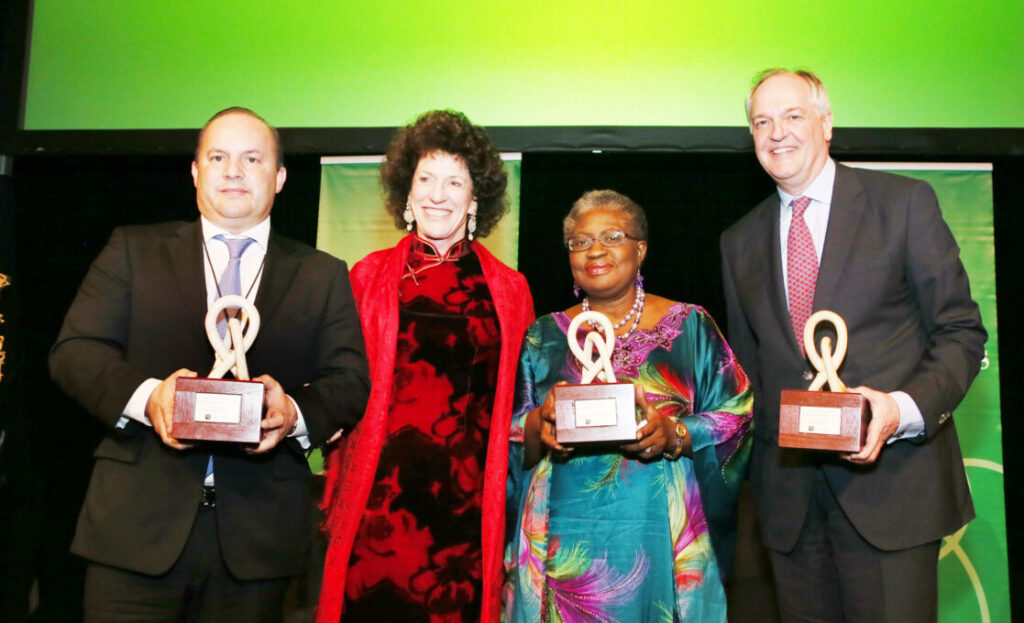
2011 – Global Leadership Award, Chicago Council on Global Affairs
2011 – President of the Italian Republic Gold Medal, Pia Manzu Centre
2014 – David Rockefeller Bridging Leadership Award
2016 – Global Fairness Award, Global Fairness Initiative
2016 – Power with Purpose Award, Devex Development Communications Network
2017 – Madeleine K. Albright Global Development Award, Aspen Institute
2017 – Women’s Economic Empowerment Award, WEConnect International
2017 – Vanguard Award, Howard University
2017 – BBC’s 100 Top Women
2020 – African of the Year, Forbes Africa
2022 – 50 Over 50: EMEA Award, Forbes
2022 – Nigerian national honour Grand Commander of the Order of the Niger (GCON)
Ngozi Okonjo-Iweala’s Books & Articles
Ngozi Okonjo-Iweala has written several articles and books, including Women and Leadership: Real Lives, Real Lessons co-authored with Julia Gillard, Finding A Vaccine is Only the First Step, Fighting Corruption is Dangerous: The Story Behind the Headlines, Reforming the UnReformable: Lessons from Nigeria, Mobilizing Finance for Education in the Commonwealth, Shine a Light on the Gaps — an essay on financial inclusion for African Small Holder Farmers, Funding the SDGs: Licit and Illicit Financial Flows from Developing Countries, and The Debt Trap in Nigeria: Towards a Sustainable Debt Strategy, and Chinua Achebe: Teacher of Light co-authored with Tijan Sallah.
Ngozi Okonjo-Iweala’s Siblings
Her only sister, Njide Okonjo-Udochi, is the first black female to emerge as the Family Physician of The Year 2021 in Maryland, US. Her brother, Ifechukwude Chukwuka Okonjo succeeded their father as king, after his demise. While her youngest sibling, Onyema Okonjo, is the CEO of Giant Beverages, Lagos.
SEE: Atiku Abubakar Net Worth, Biography and Political History
Ngozi Okonjo-Iweala’s Husband
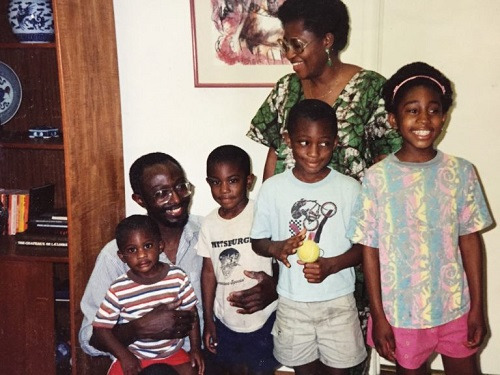
Ngozi Okonjo-Iweala is married to Ikemba Iweala, a neurosurgeon from Umuahia, Abia state. They have four children and three grandchildren.
Ngozi Okonjo-Iweala: Children
She has three boys and a girl. Two of her sons, Uzodinma and Uchechi Iweala, as well as her only daughter, Onyinye Iweala, are doctors like her husband. However, her third son, Okechukwu, took a distinct career path. He’s a graduate of Social Studies.
Ngozi Okonjo-Iweala’s Net worth
For someone like Ngozi Okonjo-Iweala, influence and self-worth is more important than net worth. Yet one cannot help wondering what her net worth could be. Let’s hazard a guess. Her estimated net worth is between $3.5 and $5 million.
Ngozi Okonjo-Iweala’s houses and cars
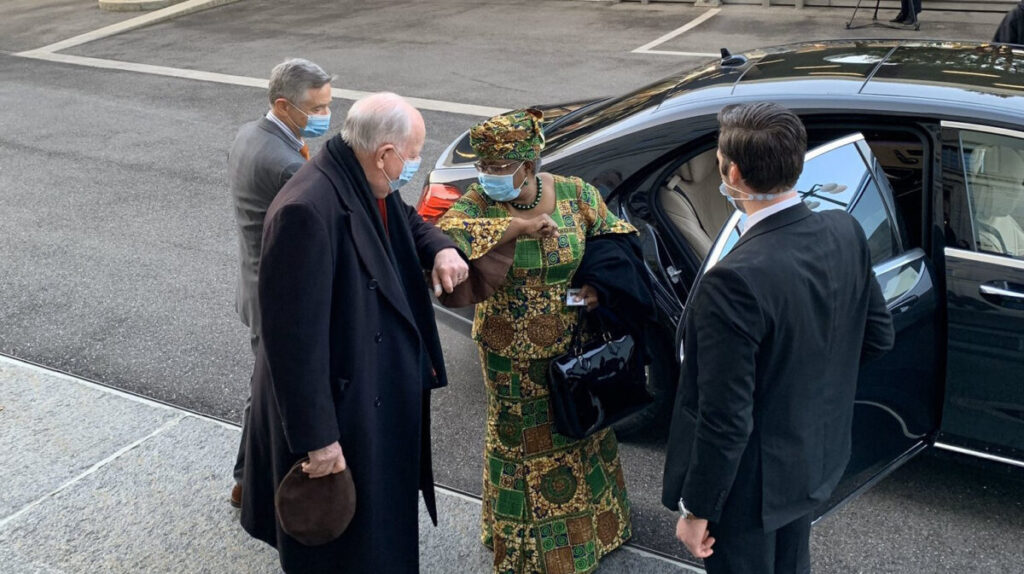
Ngozi Okonjo-Iweala is unlike your regular Nigerian politicians or musicians who crave attention by displaying their houses and cars at every opportunity. However, she and her husband have a home in Potomac, Maryland, near Washington DC. We assume they have in Abuja and their hometowns.
As for vehicles, we only get to see her alighting from them in the course of her job. Like the Mercedes-Benz S-Class, she alighted on her first day at work as the DG of the World Trade Organization. That doesn’t mean she has no personal one.
READ: Portable Biography: Real Name, Net Worth, Controversies
Ngozi Okonjo-Iweala’s Dressing Style
With her dress, she’s truly Nigerian. Ankara fabric, sensual colours, simple style, bead necklace, and headgear evoke a deep cultural reference.
Her style has captivated the attention of many young ladies in Africa and the rest of the world. Some of them even mimicked her fashion signature when she was named the DG of WTO in 2021.
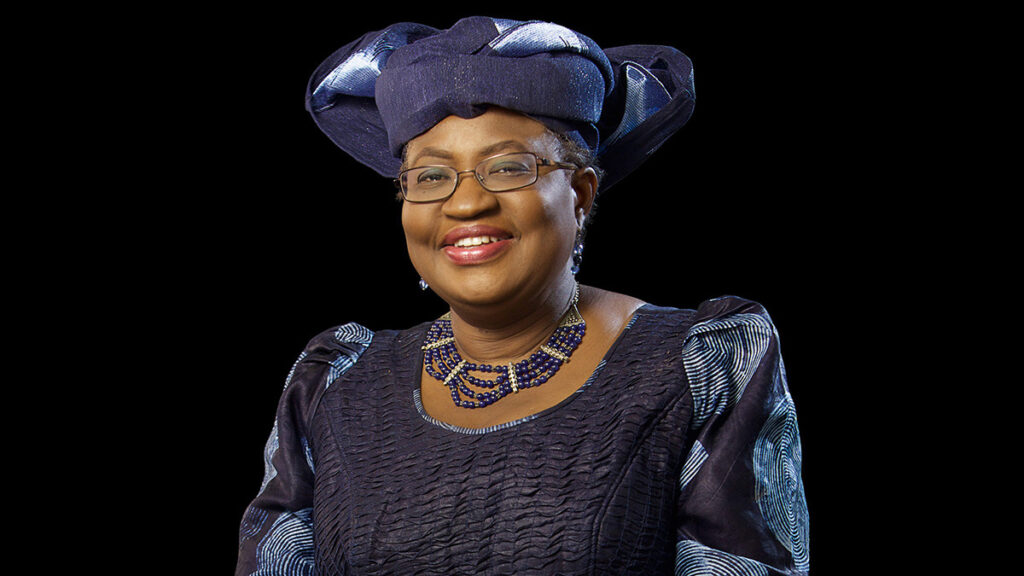
Conclusion
With Ngozi Okonjo-Iweala, Nigeria is blessed to have a successful international technocrat and a leader. She has proved her worth in several capacities and is now an inspiration to women to aspire to leadership positions in all spheres of their lives.
“There’s no right way to be a woman leader,” she said.
“Be true to yourself. Convince yourself that you have the power to be all that you wish to be. It is you who could generate the power of motivation to push you forward and ignite you to think and to do.”
If you are not a woman, don’t feel left out. Here’s the most important lesson of all for all, according to Ngozi Okonjo-Iweala.
“Go for it! Define success on your terms, achieve it by your own rules, and build a life you’re proud to live.”
The DG has spoken!



